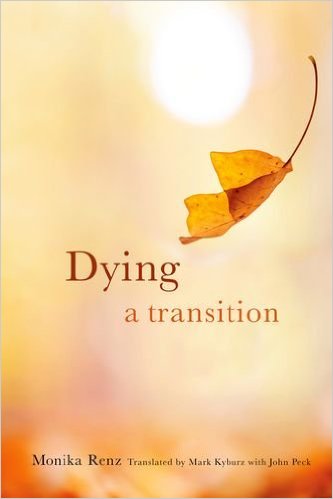
Dying: A Transition
Title: Dying: A Transition
Author: Monika Renz, PhD; translated by Mark Kyburz and John Peck
Publisher: Columbia University Press
Publication date: October 2015
Price: $38.00; hardcover, 176 pages
The night before Julius Caesar was assassinated, he had dinner with his friend Marcus Aemilius Lepidus. As they drank, the conversation turned to what was the best sort of death for a man. Caesar replied that which was sudden and unexpected. However, for many patients with cancer, the end-of-life experience is a long and complicated journey, and the overriding goal in caring for those with incurable disease is to reduce suffering and foster a sense of dignified passing. In her book Dying: A Transition, Monika Renz, PhD, provides an intimate and rich account of the phenomenologic experience of the dying process.
Dying: A Transition is based on Dr. Renz’s daily work with cancer patients and their relatives at the oncology division of St. Gallen Cantonal Hospital, one of the largest oncology and palliative care centers in Switzerland. Besides her work in the clinic, Dr. Renz has bolstered her deep understanding of end-of-life care with research.
In her early years of practice, she conducted a fascinating prospective and unselected survey of dying patients. “The study was based on my intensive accompanying of dying patients. After each intervention or encounter, I recorded everything that had or had not happened. Whenever something important in the dying process occurred, I involved the physicians and nursing staff,” writes Dr. Renz in the book’s introduction.
A Transformation of Perception
The title, Dying: A Transition, might lead a prospective reader to assume that this small elegant book is yet another clinical, treatment-oriented title that discusses emerging therapies in end-of-life care. It is not. Dr. Renz is a spiritual person, and her work and writings address issues of perception in late-stage cancer that morphine cannot.
In more than 15 years of providing end-of-life care, along with her research, Dr. Renz makes a basic claim: Dying is a transition. “Dying persons undergo a transition, which consists essentially of a transformation of perception. As we approach death, all egoism and ego-centered perception (what I wanted, thought, felt) and all ego-based needs fade into the background…. Coming to the fore is another world…. All this occurs irrespective of the individual’s worldview and faith. Dying is a process,” writes the author in the opening chapter.
This might sound like transcendental psychobabble to some impatient readers, and they will probably close the book. But that would be a mistake. Yes, there are sections, in which the author goes too deeply into territory that sounds like a holy man bathing in the Ganges River, such as, “Death as a gateway to a sphere of which we have no knowledge seems to take effect before death itself and to impel a fundamental transformation of both perception and the structure of human personality.”
And although a serious reader might feel a bit put on by Dr. Renz at times, the fact remains that the author is on the front lines of caring for our most vulnerable cancer patients, and she approaches it not as a job but as a calling. Her patients are fortunate to have her.
In a nutshell, Dr. Renz is looking to facilitate a good death for those in their last months of life. And a big part of that rests on helping clinicians gather more insight into their patients’ transformation and final peace. This is very important content, because, for one, the literature makes clear that loss of dignity and a sense of being a burden on loved ones weighs heavily on terminal patients.
For instance, Dr. Renz writes about a gentle cancer patient in his 70s who was tormented by recurring nighttime incontinence. “He felt humiliated and—as he told me—deprived of his male dignity.” After working with this particular patient for a while, something fundamental changed. “He acknowledged his illness and discovered new freedom…. It was not yet time for the final transition prior to death, which came later and unannounced. Yet, as he told me while dying, the fact that he had practiced letting go had helped him greatly,” writes Dr. Renz.
Dr. Renz uses a multimodal set of strategies in her psychotherapy sessions, such as illness-coping interventions, trauma healing, relaxation, and spiritual care. Her psycho-oncology team comprises three therapists, each equipped with the broad training required to provide such specialized care. They work closely with palliative care physicians and the nursing staff. But as one reads this book, which is beautiful at times, it becomes clear that the foundation of the work she does with dying patients is based on empathy, love for her fellow human, and listening to everything each patient has to say and treating these words with value.
More Than Meets the Eye
Dying: A Transition is separated into seven chapters with a small appendix. Dr. Renz uses each chapter to elaborate on the central theme of the transition processes one goes through in a prolonged death such as cancer. Throughout, she claims (backed by her own clinical experience and research) that more occurs in dying than meets the eye. In short, according to Dr. Renz, human perception changes fundamentally in the process of dying, moving beyond fear and pain.
Understanding the various transition points helps practitioners grow more cognizant of the changing emotions and symptoms of the patients under their care, enabling them to respond with the utmost respect for their dignity. All of the above results in better cancer care outcomes. Readers of this book need to be open-minded and not let some minor irritants spoil what is otherwise an important book—one that goes places in the human heart that other books on this subject have not. Dying: A Transition is recommended for readers of The ASCO Post. ■

